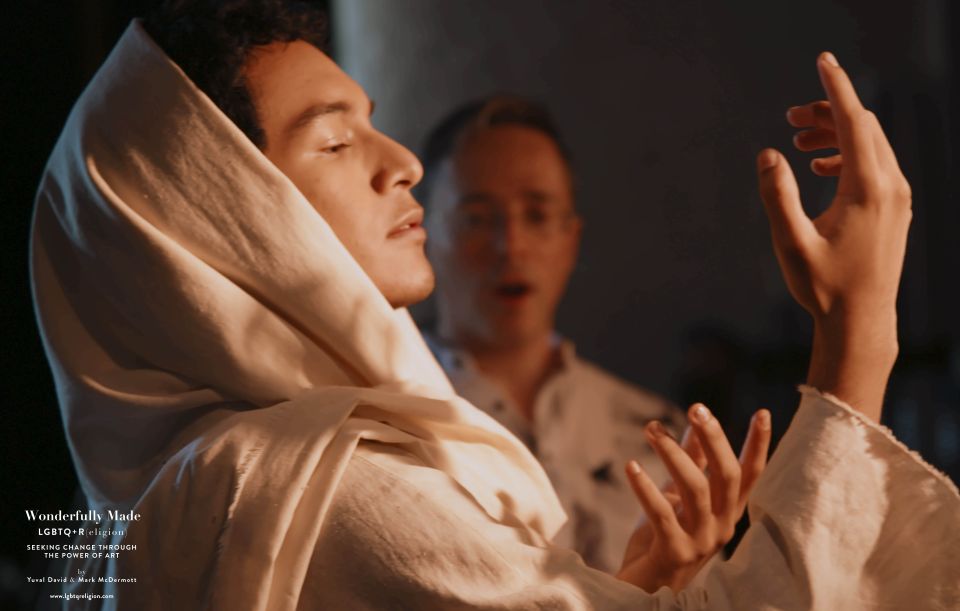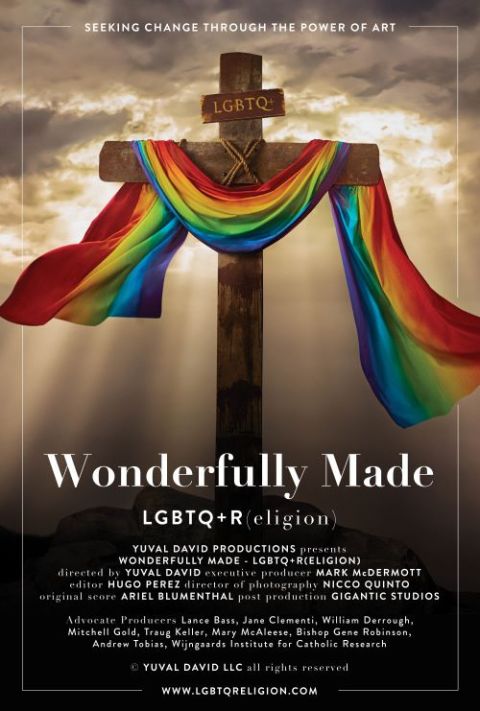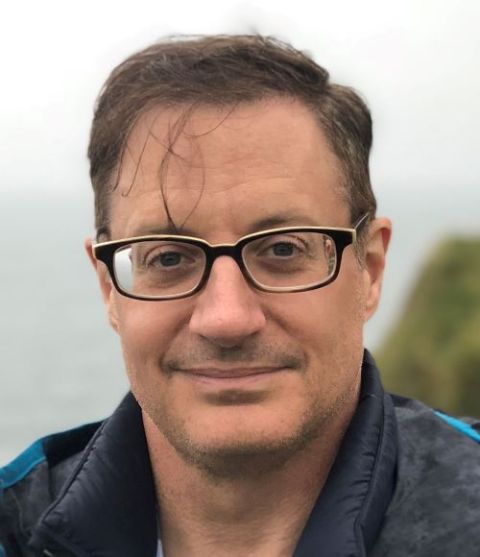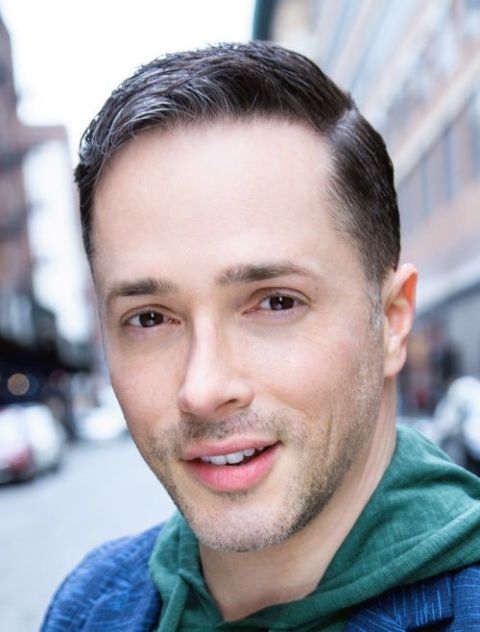9.30.22 Wonderfully Made POSE .jpg

After watching his husband, Mark McDermott, search for an image that represented his Catholic and gay identity, Yuval David, who is Jewish, decided to help him create their own LGBTQ+ Catholic iconography. In the next three and a half years, the iconography project evolved into a documentary titled "Wonderfully Made," featuring interviews with prominent Catholic advocates for LGBTQ+ people.
McDermott, who is the film's executive producer, also helped launch Outreach, an LGBTQ Catholic resource from America Media, and used his connections to assemble a variety of Catholic advocates.
9.30.22 Wonderfully Made POSTER.jpg

The film includes interviews with Natalia Imperatori-Lee, Fr. Bryan Massingale, Jesuit Fr. James Martin, Marianne Duddy-Burke, Stanley "J.R." Zerkowski, Loretto Sr. Jeannine Gramick, Miguel Díaz, Cathy Renna, Xorje Olivares and Jason Steidl.
"If we can't imagine ourselves in the image of God, that does irreparable spiritual harm to us," Massingale, a Black gay priest, said in the film. Massingale, who said he does not know of any other openly gay Black priests, spoke about being asked to pray over the story of creation at a seminary retreat and struggling to imagine himself within that story.
"Wonderfully Made" draws its name from Psalm 139: 13-14, Martin's recommended Bible verse for LGBTQ+ Catholics: "For it was you who formed my inward parts; you knit me together in my mother’s womb. I praise you, for I am fearfully and wonderfully made. Wonderful are your works; that I know very well."
The film follows the audition and photoshoot process for nine LGBTQ+ models portraying Jesus in various traditional poses, such as Jesus on the cross. The images feature rainbow and transgender pride flags and colors.
McDermott said it was important for the models to use familiar poses and wardrobe for the iconography. "The last thing I wanted to have happen was for somebody to look at a picture and say, 'Oh, that's a gay person praying.' No, I want them to look at it and say, 'Oh, that looks like an LGBTQ Jesus.' "
McDermott realizes that some viewers might interpret the photos of LGBTQ women as depictions of Mary Magdalene or Mary, the mother of Jesus, but he sees that as a positive thing.
"One thing that we focused on is we wanted people who were ethnically ambiguous," David said, explaining that the filmmakers are hoping the audience is able to recognize themselves in the images of Jesus.
‘If we can't imagine ourselves in the image of God, that does irreparable spiritual harm to us.’
—Fr. Bryan Massingale
Massingale accompanied the models during the photoshoot. At one point in the film, he clasps one model's hands and says, "You have a chance, we have a chance here to show our younger selves the image that would have made all the difference for us, and we can do it for someone else now."
The film ends with the interviewees' reactions to and reflections on the new iconography with both broad smiles and watery eyes.
"It's really visceral," Steidl said.
Looking at an iPad, Massingale said, "That image speaks to me so powerfully. It speaks to me because I can see myself in my own times of struggle. I've been there." He said that he connects the iconography to the tears he and other LGBTQ+ people have shed while grappling with their identities.
9.30.22 Mark McDermott.jpg

Olivares reflected on the power of these images for LGBTQ+ youth. "This is the stuff I should have seen when I was younger because then all those other doubts and all those other questions and all those years of being unsure of myself would have gone away," Olivares said.
"That's gorgeous," Duddy-Burke exclaimed, looking at the images. "It's that sense of when I've gotten to the bottom and feel like all hope has been abandoned, my faith always brings me back to a place of saying no, there is still hope. Resurrection is the end of the story."
At the end of the film, the images are finally revealed to the audience. When NCR asked about including photos of iconography in this story, the filmmakers asked readers to watch the film instead.
"Wonderfully Made" features several moments where the U.S. Catholic hierarchy were silent or expressed anti-LGBTQ+ views when the community faced tragedy.
The documentary shows graphic video from the 2016 Pulse nightclub shooting, and states that "church authorities showed little empathy for the LGBTQ community," highlighting the silence of church leaders about the shooting's impact on the LGBTQ community.
The filmmakers also say that only 14 of over 400 active and retired U.S. bishops signed a statement expressing support for LGBT youth after the death by suicide Tyler Clementi, whose roommate had posted online videos of his romantic encounter with another man. The bishops' statement tells LGBT people, "know that God created you, God loves you and God is on your side." The film shows the conservative Catholic backlash against these statements.
In the film, McDermott also connects the crucifixion with the heightened risk of suicidality that LGBTQ+ people face.
Imperatori-Lee had a similar reflection. "I think of the LGBT community as a crucified community, people who we put our sins onto, people who we put our shame onto, in an effort to feel better about ourselves," she said.
9.30.22 Yuval David.jpg

"Wonderfully Made" is being featured at the Woodstock Film Festival, Portland Film Festival, and Out on Film, Atlanta's LGBTQ film festival.
McDermott said that "Wonderfully Made" is timely because of the prominence of LGBTQ+ inclusion in synodal discussions. "The synod has helped crystalize (the issue)" he said.
While the issue of inclusion is "timeless," McDermott added, "it's getting more urgent because people aren't really satisfied with things."
David and McDermott envision "Wonderfully Made" as the first film in a series called LGBTQ+R(eligion). In future films, they hope to expand their exploration of LGBTQ+ issues to other faith traditions.
"The vast majority of anti-LGBTQ legislation, laws, regulations and opinions are on the basis of religion," David said. "So it was important to look at religion as a whole and say, well, let's look at what happens when these two identities come together because they do intersect in the Venn diagram of life."
"Not every tradition, including Judaism, necessarily looks at iconography the same way Catholics do," McDermott added. "We do think it important to continue with the thread of art because our theme here is seeking change through the power of art." McDermott acknowledged that continuing with this theme within other faith traditions will require creativity and respect.
Advertisement
Advertisement
McDermott and David have major ambitions for the film. For David, success means "that the widest audiences see it, that we can get people to be fans and followers across social media for the film, that people can use this film as a teaching tool and a conversation starter to influence legislation."
The filmmakers hope that a good response could secure its place on a major platform, where it can reach broader audiences and spark greater conversations.
As McDermott says in the film, "This project welcomes LGBTQ+ people to reconnect with the spiritual realm in a way that hopefully speaks to them by depicting Jesus as suffering with and for them."
Editor's Note: This story has been updated to correct Mark McDermott's name in a cutline and correct a reference to Psalm 139.



